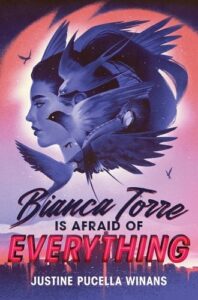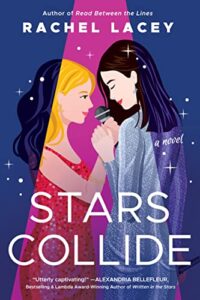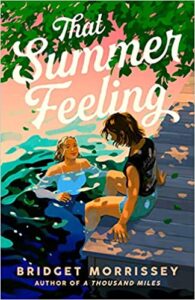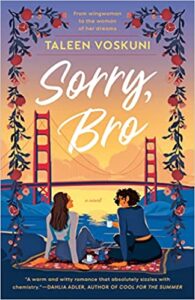Buy this from Bookshop.org to support local bookstores and the Lesbrary!
Bianca has overwhelming anxiety, especially social anxiety, to the point that trying to have an everyday conversation is a monumental struggle. They keep a numbered list of fears, like “Fear #6: Initiating Conversation,” “#13 Beautiful People,” and “#11 Parents Discovering They’re a Raging Lesbian.” So they’re definitely not going to ask out the cute girl in their birdwatching group. Or even speak to her at all. Bianca compares themself to lesbian sheep, standing beside each other perfectly still, hoping the other makes a move.
The only person other than family she feels comfortable around is Anderson. They bonded over anime, though Anderson is too cool to admit to liking manga and anime at school.
If it was up to Bianca, they would stayed in that safe bubble forever, but while people watching with their birdwatching telescope, they witness a murder in building across the street by someone wearing a plague doctor mask. Getting up the courage to tell the police is hard enough, but when the cops dismiss them and rule the case a suicide, Bianca is now the only one who can get justice for the neighbour who used to put bird drawings on his window for them to enjoy. (The cops are useless at best in this book, and I appreciated that: it is a murder investigation that doesn’t glorify the police at all.)
This is a satirical mystery perfect for fans of Only Murders In the Building. It’s whacky and over-the-top when it comes to the murder case, but the interpersonal and self-discovery elements feel grounded. Bianca ends up convincing Anderson and Elaine (from the birding group) to help investigate, changing their dynamic and bringing them closer together.
Meanwhile, Bianca is having Gender Feelings. At first, it’s not conscious, like feeling uncomfortable in their body and enjoying being compared to a male character. As they reluctantly explore these feelings, though, they begin to experience gender euphoria by changing their gender expression, coming out to some people as nonbinary, finding nonbinary friends and community, and using they/them pronouns. This is one of the few books I’ve read with a character who identifies as a nonbinary lesbian!
This was a lot of fun, and I appreciated both the satirical murder mystery plot and the well-rounded characters.
“Perhaps the real murder investigation is the friends we make along the way.”




